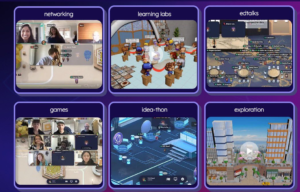@NewSchools Summit, Three Reasons We Can Never Turn Off the Web
Attended the Community of Practice session this morning at the NewSchools Venture Summit.
Lots of entrepreneurs. Some teachers. Portfolio companies.
A group discussion to fire up the crowd focused on whether schools should be a safe haven from an always on mentality and culture.
Three Reasons Why Forces Will Conspire to Facilitate an Always On Learning Environment
1. Humans seek communities. This may sound more existential theory than business logic. But think of the system fostered by modern day school activities as causing feelings of isolation for some students. The adolescence process is a full-on ambition to meet and discover new people and one’s own identity. If you consider that there are more young people, 6 million of them, than ever before, I find it hard to believe you can slow down that massive self-and-society discovery process.
A sub thought of this is: Internet usage is like the gateway drug for community interaction. Students who may be shy or who may feel isolated can use and do use the Internet to foster relationships. Try turning that off. A student is bound to learn more when they are allowed to supplement their learning time in a physical environment with one in a virtual environment.
I am no expert, but I would be willing to bet it increases the likelihood of social interaction among peers.
2. The more you are exposed to the internet, the more you are exposed to the shrinking relevance of a printed publishing model. It’s gotten to the point that the rapidly irrelevant print only model has left some people asking crazy questions, like: Can the iPad save publishing?
The iPad is an Always On device. It’s an internet portal device. If by saving publishing you mean rapidly drawing people’s attention to the virtual publishing model, then yes. If you mean getting them to read more books, then no, it’s not going to save publishing.
Look at the value here with Internet use: Time spent with the internet can actually create new knowledge in a way that reflection and interaction with a traditional reading “platform” cannot. Internet use enables active processing of current knowledge with opportunities to “test case” future processes. IT’s a live test bed for new ideas and even new facts. Kids today are learning in the future right now.
3. The business conversations and social interactions that children today will be having after they finish school are likely to be with people who do not live in the same country as them. People today travel more globally than they have ever traveled in the history of the world. Kind of hard to see that reality fading.







0 Comments
Leave a Comment
Your email address will not be published. All fields are required.